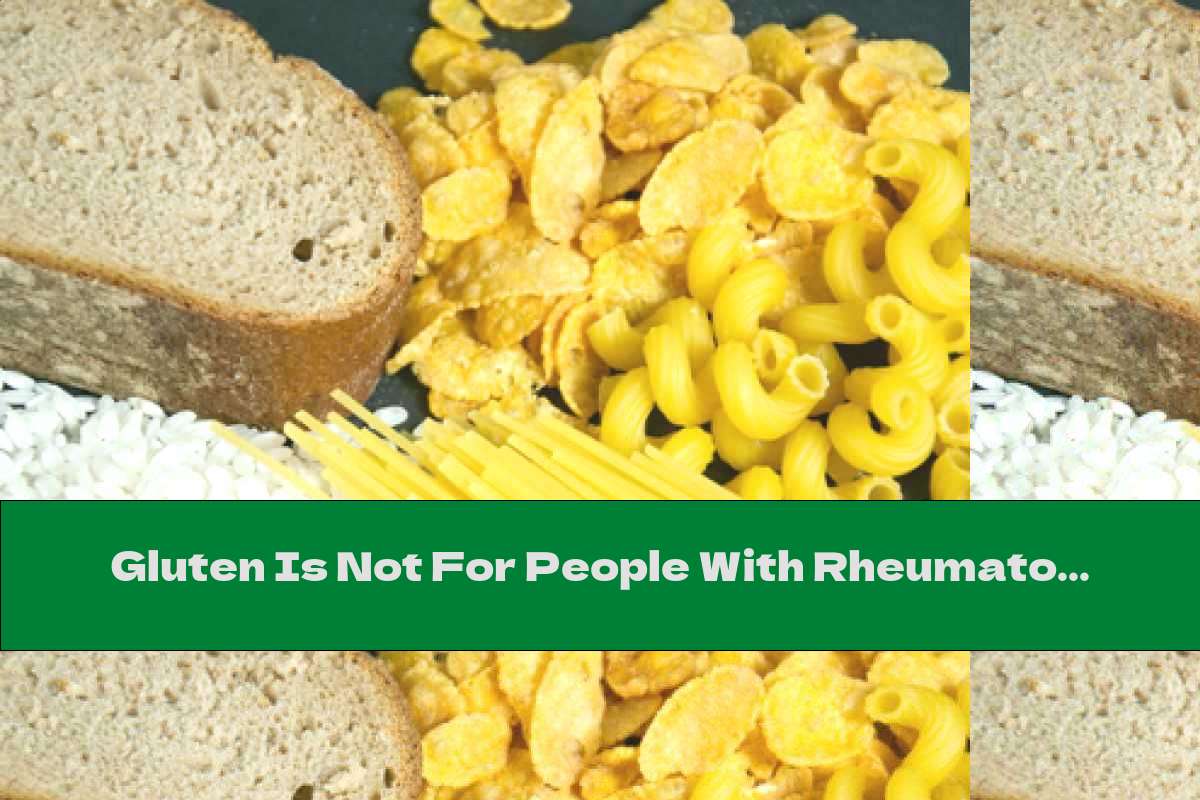Gluten Is Not For People With Rheumatoid Arthritis
 Author: Mark Velov
Time for reading: ~2
minutes
Last Updated:
August 08, 2022
Author: Mark Velov
Time for reading: ~2
minutes
Last Updated:
August 08, 2022

Which products should be avoided in rheumatoid arthritis and why? Which ones to include in the menu?
Limiting gluten and excluding certain foods from the menu helps to improve the condition in some patients with rheumatoid arthritis. It is known that in case of gluten intolerance the consumption of foods containing it leads to an increase in inflammatory markers. There is still no clarity about the link between limiting gluten in the diet and improving the symptoms of rheumatoid arthritis, which scientists need to clarify.
The fact is, however, that the reduction of some products is useful in controlling the symptoms of this disease, which is found in studies of medical teams.
Rheumatoid arthritis is a chronic disease in which the immune system attacks its own tissues and synovial fluid in the joints like foreign bodies. As a result, their damage develops.
Celiac disease is also an autoimmune disease. It occurs in 1 in 100 people, according to the American Foundation for Disease Control. Consumption of gluten-containing foods in those affected causes digestive problems, bloating, sluggishness. In their more severe form, the complaints include pain, swelling and inflammation in various parts of the body, including the joints.
The reason is that the immune system accepts gluten as a foreign body and activates the protective forces for its removal by attacking its own tissues that contain it.
Some of these inflammatory agents, proteins, enter the bloodstream and cause some changes in the joints that create sensations similar to the symptoms of arthritis. In this regard, the exclusion of gluten-containing products and adherence to a healthy diet helps people suffering from rheumatoid arthritis.
It is also necessary to exclude those containing sugar and technologically processed .
People with rheumatoid arthritis are more likely to suffer from celiac disease or gluten intolerance than people without the disease. Data from a study published by the National Center for Biotechnology Information show that specific antibodies to celiac disease and rheumatoid arthritis are more common in patients with rheumatoid arthritis and Sjögren's syndrome than in other people.
Another study found that patients with celiac disease had elevated levels of rheumatoid arthritis, and conversely, those with rheumatoid arthritis had positive rates of celiac disease.
To diagnose celiac disease or gluten intolerance, doctors order a blood test to detect specific levels. At high levels, it is recommended to exclude gluten from the menu. In some cases, specialists may order a biopsy of small bowel tissue to confirm the diagnosis. In order to avoid a false negative result in the examination of the taken tissue, it is necessary to consume gluten-containing food before the biopsy, the specialists specify.
Which foods are appropriate to consume in this case? Vegetables, fruits, seafood, red meat, chicken, eggs, dairy products, legumes, nuts.
Cereals that do not contain gluten are: rice, corn, quinoa, sorghum, millet, buckwheat.
Gluten-free flours are also available on the market, such as: potatoes, almond flour, hazelnuts or acorns, coconut, beans, lentils, chia and others.
Gluten contains: wheat, einkorn, bulgur, semolina, barley, rye and others.
Gluten also contains some seemingly unexpected products such as: brewer's yeast, malt vinegar, juices, shakes, dressings, soups, beer, some wines and more.
It is recommended for people with rheumatoid arthritis to avoid some other products that worsen inflammatory processes such as salty foods, processed foods, oils, oil, sugar and animal products.
Related Articles
- Nutrition for Respiratory Health: Supporting Your Lungs with the Right Foods
- The Ultimate Guide to High Gluten Foods: Benefits, Sources, and Recipes
- The Ultimate Guide to High Gluten Foods: Effects, Benefits, and Recipes
- Boost Digestive Health with Buffer 500 - Benefits & Recipes
- Boost Your Health with Buffer 500: Benefits, Recipes, and More
Top Nutrition Articles Today
- . The Latest Food Pyramid: A Guide to Balanced Nutrition
- . Nutrition Guide: Importance of Food Pyramid, Meal Planning,...
- . Hydrochloric Acid in Digestion: Importance, Symptoms, and Na...
- . Peyronie's Disease and Nutrition: Exploring the Connection
- . All You Need to Know About E471 in Food: Functions, Foods, H...
- . The Ultimate Guide to Raising Agents E450 E500 E501 in Bakin...
- . The Role of Water in Nutrition: Importance and Functions Exp...
- . The Ultimate Guide to the Food Pyramid in Nutrition: Benefit...
- . The Ultimate Guide to Nonfat Dry Milk: Benefits, Recipes, an...
- . List of Foods that Contain Carrageenan: A Guide to Avoiding...